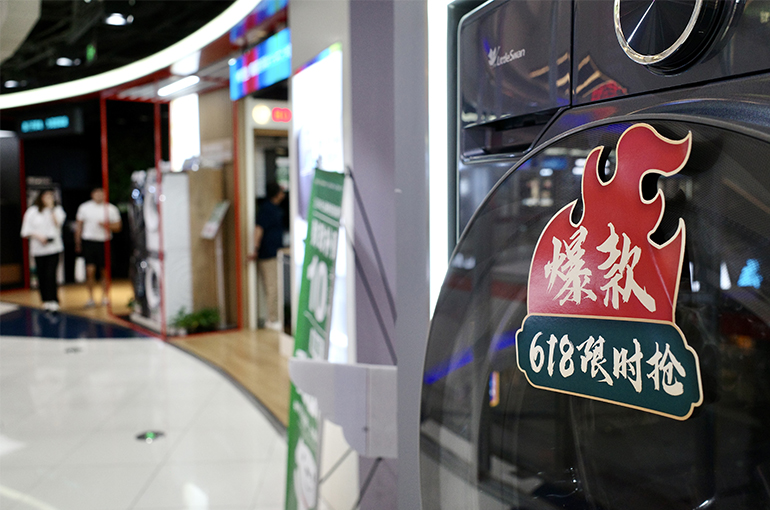 China's Mid-Year Shopping Gala Deepens Home Appliance Price War
China's Mid-Year Shopping Gala Deepens Home Appliance Price War(Yicai) June 19 -- Price wars in China’s market of home appliances, including 100-inch television sets and air conditioners, are intensifying, as the midyear shopping festival shows.
Besides the big discounts of well-known brands, even emerging categories such as coffee machines offered prices with nearly no margin amid fierce competition during the weeks-long June 18 shopping gala, Li Xiaoxiong, general manager of Hamilton Beach Brands China Marketing Center, said yesterday.
Despite sales promotions on 80-inch or larger screens, sales were poor, Zhang Hong, research director of Sigmaintell’s TV department, told Yicai, citing feedback from brands.
Even the ongoing UEFA European Football Championship failed to boost demand. From May 20 to June 9, online sales of color TVs dipped 37 percent to 833,000 units from a year ago with sales dropping 27 percent to CNY3.1 billion (USD427.2 million), according to data from All View Cloud Data Technology.
When asked about the profitability of 100-inch TVs, Weng Zhenhua, a manager at AVC, said that new product models can generally break even, while old products may not.
According to AVC, the average price of 100-inch liquid-crystal display TVs was CNY16,954 (USD2,336) in January, but prices of some models were almost halved during the shopping festival. For example, Xiaomi launched its 100-inch Redmi TV with a price tag of CNY8,999 (USD1,240) in the first half, and Hisense’s Vidaa costs as little as CNY7,999.
Another key area of squeezed prices is the air-con market. The average discount was 18 percent during the shopping gala this year, Zhang Xiaoping, chairman of Siping Electrical Appliance, said to Yicai. Prices of 1.5P Wahin or TCL air-con units with high energy efficiency dropped to about CNY1,600, nearly erasing all profit.
Even the rising copper prices have failed to raise the prices of air-con equipment this summer due to a supply glut. Nationwide, the total inventory of household air-con units tallies around 50 million units, the highest in more than two years, Long Fei, an analyst at ChinaIOL, told Yicai.
Besides manufacturers, even e-commerce platforms compete through discounts, and stocking up on products in advance.
An e-commerce platform procured more than 500,000 units of kitchen hoods and stoves in March to prepare for the shopping festival, paying no more than CNY200 (USD28) per stove, and about CNY1,080 for an integrated stove, resulting in almost no profit for the producer, according to Jiang Wei, a manager of a kitchen appliance business in Zhongshan.
Retail channels are becoming more fragmented as online channels are growing, making up around 40 percent of sales, according to data from AVC.
Price cuts and promotions cannot help enterprises resolve the problem of excess inventories laced with a consumption downturn, said Guo Meide, president of AVC, adding that only disruptive product innovation can activate major new demand and stimulate consumption.
Editor: Emmi Laine